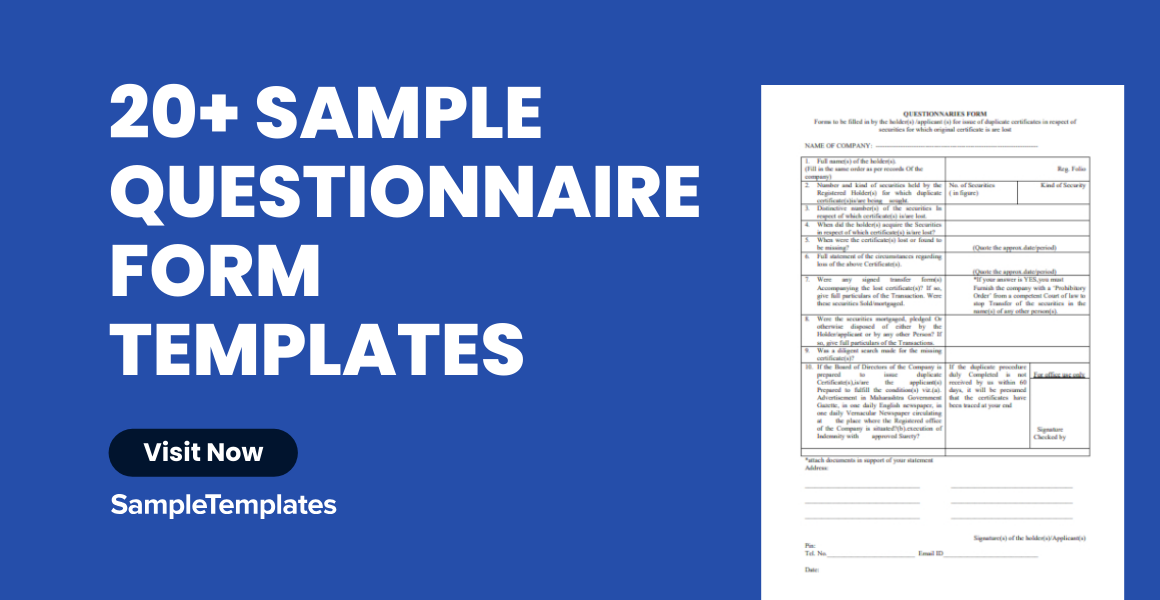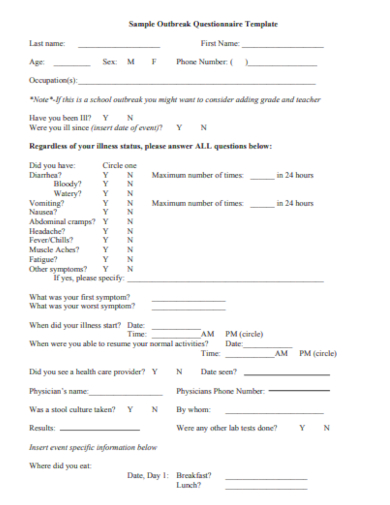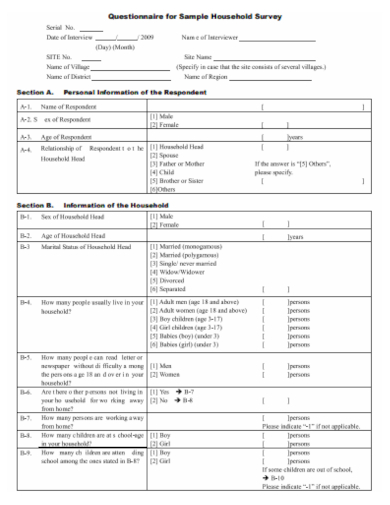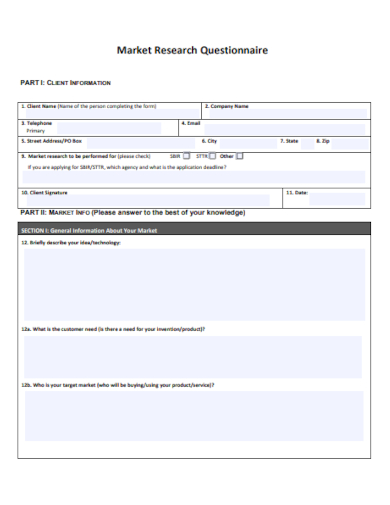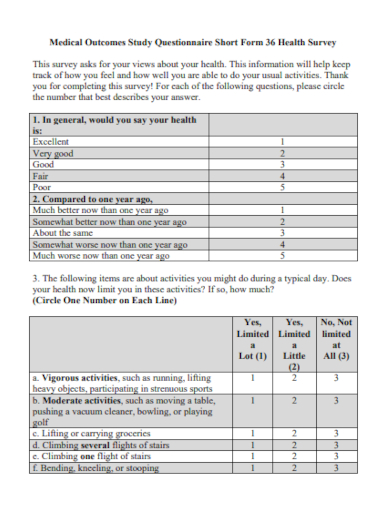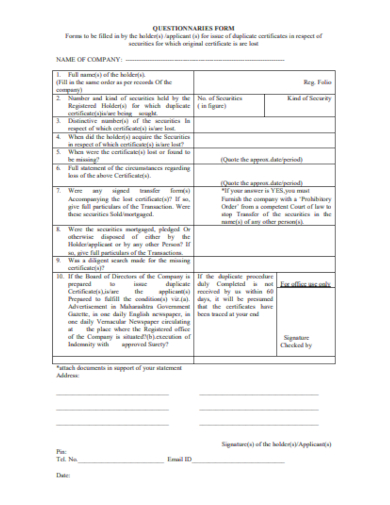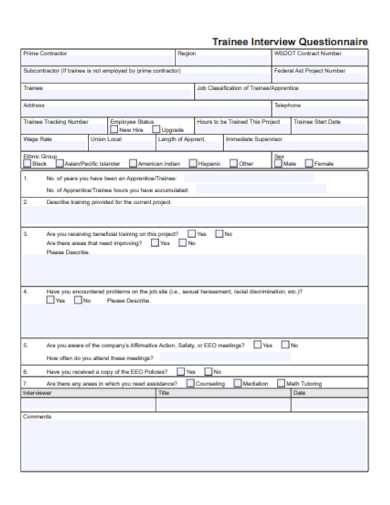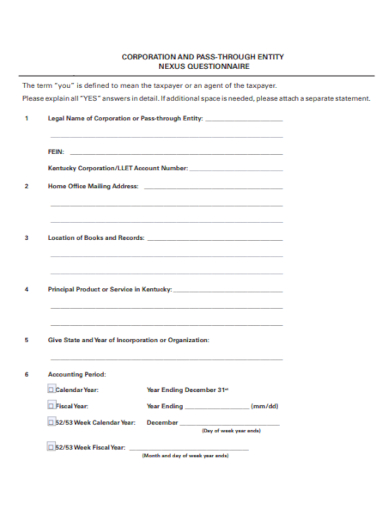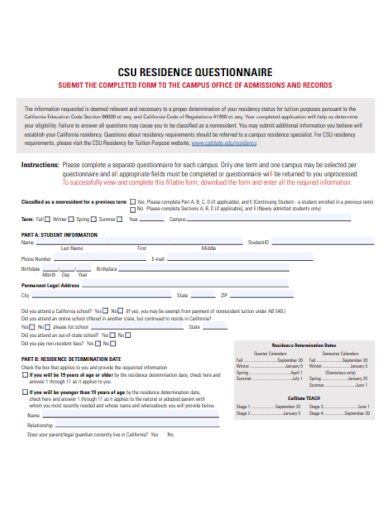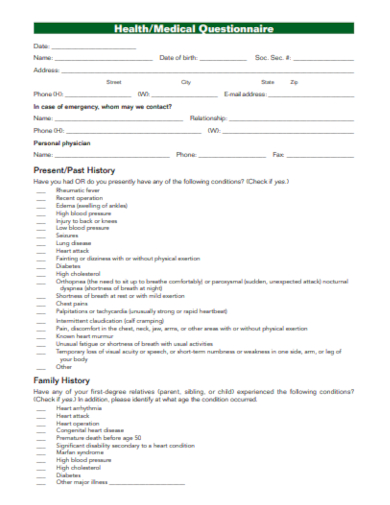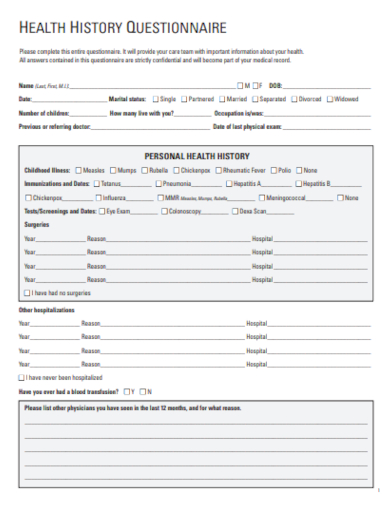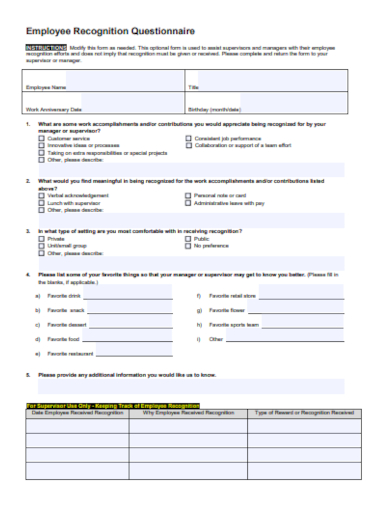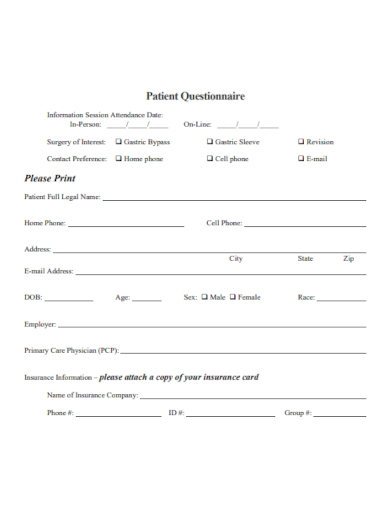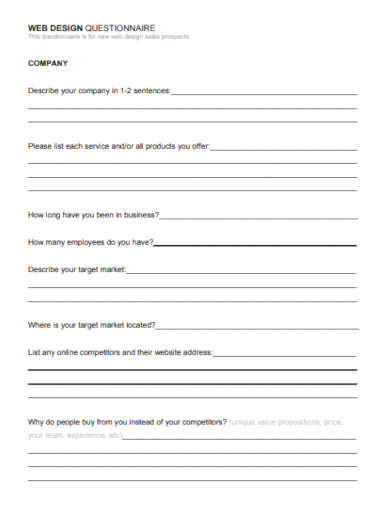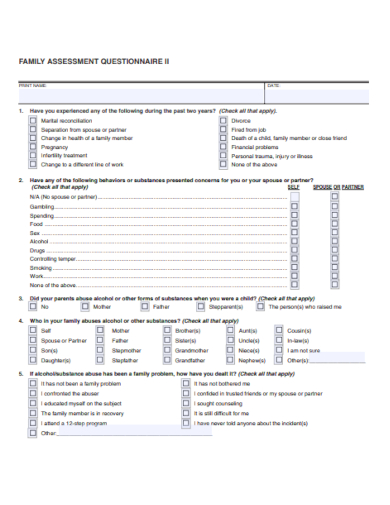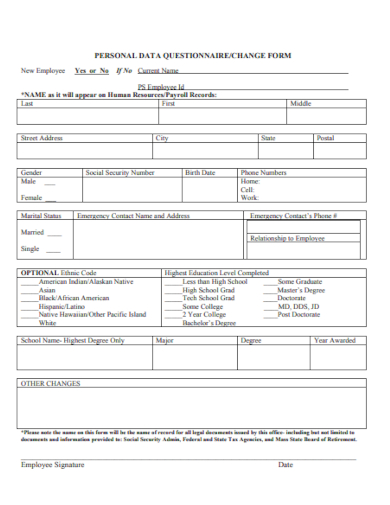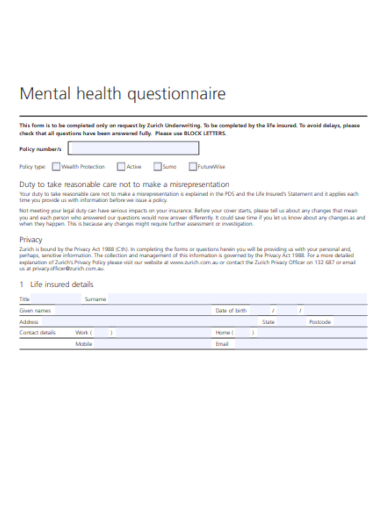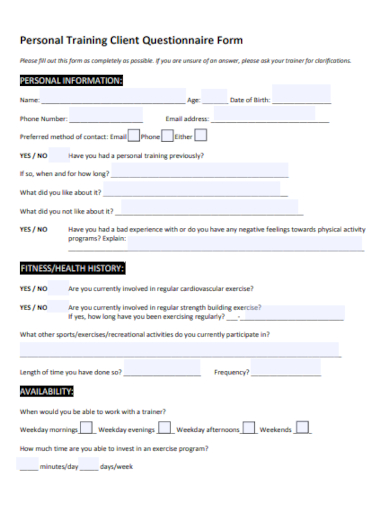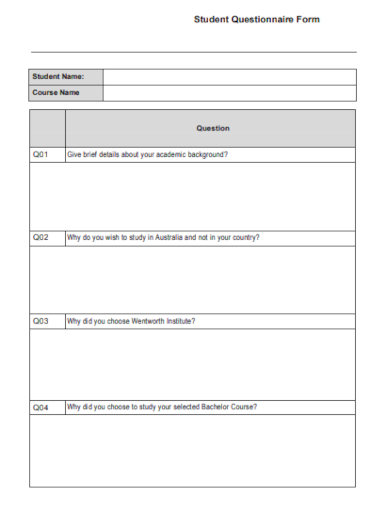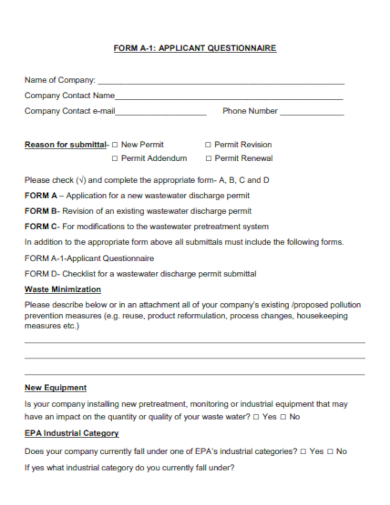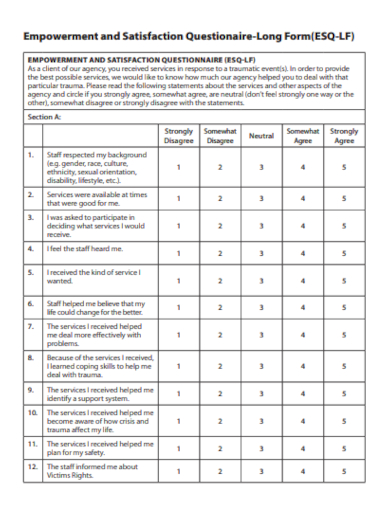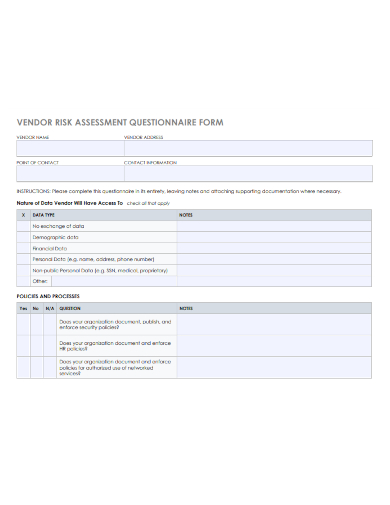Delve into the world of precise data collection with our meticulously designed sample questionnaire form. This essential tool, perfected for both novice and veteran survey designers, ensures that every query hits the mark. Whether you’re crafting a customer feedback survey, academic research, or diving into market insights, our form sets the gold standard. Embark on a journey of accurate and actionable feedback, starting with our exceptional survey.
20+ Questionnaire Form Samples
1. Questionnaire Form Template
2. Sample Questionnaire Form
3. Research Questionnaire Form
4. Survey Questionnaire Form
5. Questionnaire Form in PDF
6. Trainee Interview Questionnaire Form
7. Printable Questionnaire Form
8. Questionnaire Form in Word
9. Medical Questionnaire Form
10. Health Questionnaire Form
What is a Questionnaire Form?
A questionnaire form is an instrument used primarily to solicit responses from participants for data collection. It’s an indispensable tool in fields like research, marketing, psychology, health studies, and many other disciplines where gathering quantitative or qualitative data analysis is necessary.
The Evolution of Questionnaire Forms
In the past, questionnaire forms were largely paper-based. Participants would manually fill out these forms, which were then collected, tabulated, and analyzed. With the digital age, however, the process has become vastly more efficient. Online questionnaire forms can be disseminated through email, embedded on websites, or shared on social platforms, making them accessible to a larger audience.
Structural Components
The typical questionnaire form contains a series of questions crafted to collect specific types of data. These can range from simple yes-or-no questions, multiple-choice questions, Likert scale (rate from 1 to 5 or 1 to 7, for instance), to open-ended questions where participants can provide more elaborate answers.
Purpose and Application
The utility of a questionnaire form is vast and varied. For businesses, they can be used to gather customer feedback, understand market dynamics, or test the viability of a new product. In academia, they’re essential for collecting research data, gauging student or faculty feedback, or understanding demographic specifics. Healthcare professionals use them to collect patient history, dietary habits, or mental health statuses. Essentially, any situation where you need to collect structured information from a group of people, a questionnaire form is likely your best tool.
Advantages and Limitations
The strength of a questionnaire form lies in its ability to collect large volumes of standardized data efficiently. It’s cost-effective, especially in its digital form, and can reach a broad audience quickly. However, they do come with limitations. The quality of data is highly dependent on how the questions are phrased, and there’s always a risk of misinterpretation or bias. Moreover, while they can provide quantitative data adeptly, qualitative insights might be more limited unless coupled with in-depth interviews or focus groups.
How Do You Write a Questionnaire Form?
Writing a compelling and effective questionnaire form is both an art and a science. It demands a clear understanding of the purpose, audience, and the type of data you’re aiming to collect.
Define the Purpose
Before you begin, it’s essential to clarify the objective of your questionnaire. Are you trying to understand customer preferences? Gauge employee satisfaction? Or collect research data for a study? Your purpose will dictate the structure and type of questions you include.
Understand Your Audience
Tailoring your questionnaire to your audience ensures better engagement and more accurate responses. Consider factors like age, cultural background, educational level, and familiarity with the topic when framing your questions.
Craft Clear and Concise Questions
Ambiguous or leading questions can skew your data. Ensure that each question is straightforward, free from jargon, and doesn’t lead the participant towards a particular answer.
Use Varied Question Types
While multiple-choice questions or Likert scales can provide quick quantitative data, including open-ended questions can offer deeper insights. A mix of different question types will enrich the data you collect.
Pilot Test Your Questionnaire
Before rolling out your questionnaire to a larger audience, conduct a pilot test. This trial run will help you identify any confusing questions, technical glitches, or areas of improvement.
Consider the Flow
Structure your questionnaire logically. Start with general questions and gradually move to more specific ones. If the questionnaire is long, consider using section breaks or group related questions to make it more digestible for the participant.
Ensure Anonymity and Confidentiality
Many people might hesitate to provide honest answers if they feel their responses can be traced back to them. Assure participants of their anonymity and the confidentiality of their responses.
End with a Thank You
Always conclude your questionnaire with a note of appreciation. This not only conveys gratitude but also leaves participants with a positive impression, increasing the chances of future participation.
In sum, crafting a successful questionnaire form is a meticulous process, but with attention to detail and an understanding of your target audience and purpose, you can gather invaluable data to inform your decisions and strategies.
11. Employee Questionnaire Form
12. Patient Questionnaire Form
13. Web Design Questionnaire Form
14. Family Assessment Questionnaire Form
15. Personal Data Questionnaire Form
16. Mental Health Questionnaire Form
17. Client Questionnaire Form
18. Student Questionnaire Form
19. Applicant Questionnaire Form
20. Satisfaction Questionnaire Form
21. Assessment Questionnaire Form
What’s the Difference Between a Survey and a Questionnaire?
In the world of data collection and research, the terms “survey” and “questionnaire” are often used interchangeably. However, there are subtle yet essential differences between the two. Understanding these distinctions is crucial for anyone looking to gather information accurately and effectively.
Concept and Definition
A questionnaire is a structured tool comprised of a series of questions designed to fetch specific types of information from respondents. It acts as the instrument used to collect data. Typically, these questions can be open-ended, giving respondents the freedom to answer in their own words, or closed-ended, where they select from provided options.
A survey, on the other hand, is a method or process of gathering, analyzing, and interpreting data from a group. It is broader in scope and often employs a questionnaire as its primary data collection tool, but can also include other methods like interviews.
Purpose and Application
While a questionnaire seeks to gather straightforward data, a survey aims to understand broader phenomena or trends. For instance, a business might use a questionnaire to gather customer feedback about a product’s features. The same business might conduct a survey to understand the market position of that product compared to competitors, using several questionnaires, interviews, and other data collection methods.
Flexibility and Adaptability
Questionnaires are static. Once designed, the set of questions remains consistent across all respondents. This uniformity ensures standardized data collection.
Surveys, being a more encompassing process, can be adaptive. For example, in a face-to-face survey interview, subsequent questions might change based on the respondent’s previous answers.
Analysis and Insights
Data collected through a questionnaire is raw. It provides direct answers to the posed questions but doesn’t delve into patterns, correlations, or underlying reasons.
Surveys take it a step further. The collected data, often from multiple questionnaires and sources, undergoes rigorous analysis to draw comprehensive insights, conclusions, or generalizations about the studied group or phenomenon.
In essence, while questionnaires are about the “what,” surveys often venture into the “why” and “how.”
How Do Businesses Use Questionnaires and Surveys?
In today’s data-driven business landscape, both questionnaires and surveys play pivotal roles in decision-making, strategy formulation, and stakeholder engagement.
Understanding Market Dynamics
Businesses often roll out surveys to understand market trends, customer preferences, and emerging demands. By using questionnaires within these surveys, they can gather quantifiable data, making trend prediction more accurate.
Product Development and Enhancement
Before introducing a new product or refining an existing one, companies often send out questionnaires to a select group of users. This feedback helps in making data-backed improvements and modifications.
Customer Satisfaction and Feedback
Post-sales surveys, often containing questionnaires, allow businesses to gauge customer satisfaction, understand pain points, and gather feedback. This not only aids in improving products and services but also strengthens customer relations.
Employee Engagement and Feedback
Internal surveys help companies understand employee satisfaction, workplace challenges, and organizational health. Regular feedback through questionnaires can provide insights into team dynamics, training needs, and areas of improvement.
Brand Perception and Positioning
Surveys that explore how a brand is perceived in the market can guide advertising campaigns, branding strategies, and public relations efforts. By employing questionnaires, businesses can quantify brand awareness levels and measure the effectiveness of marketing campaigns.
Competitive Analysis
Understanding competitors is as crucial as understanding one’s own business. Surveys, often with a mix of questionnaires and interviews, can provide insights into competitors’ strengths, weaknesses, and market strategies.
In conclusion, while questionnaires and surveys are closely related tools in the realm of data collection, they serve distinct purposes. Businesses, by leveraging both effectively, can harness the power of data to make informed decisions, predict market trends, and build stronger relationships with stakeholders.
Related Posts
Sample Sworn Affidavit Forms
Vehicle Inspection Forms Samples & Templates
Sample Employee Advance Forms
Sample Child Travel Consent Forms
Sample Testimonial Request Forms
Sample Employee Details Forms
Sample Divorce Forms
Sample Attestation Forms
Employee Performance Appraisal Form Templates
FREE 9+ Sample Presentation Evaluation Forms in MS Word
FREE 10+ School Admission Form Samples & Templates in MS Word | PDF
FREE 30+ Patient Consent Form Samples in PDF | MS Word
FREE 10+ Sample Sign Off Form Templates in PDF | MS Word
FREE 11+ Sample Medical Consultation Forms in PDF | MS Word
FREE 8+ Sample Donation Forms in PDF | MS Word
